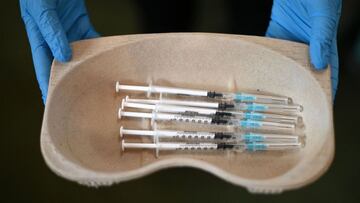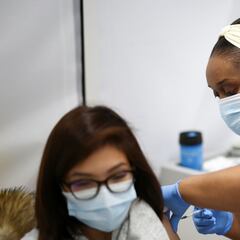Is armpit pain after the covid vaccine or booster shot a normal symptom?
Swollen lymph nodes causing a sore armpit after an mRNA covid-19 vaccine is a normal reaction and a sign the body’s immune system is working correctly.


If you or someone you know is suffering from armpit pain after receiving a covid-19 vaccine or booster shot here’s what you need to know.
Armpit pain is a recognised side effect of the Moderna and Pfizer -BioNTech covid vaccines - the ones that use mRNA (messenger RNA) technology. While it can be painful it is usually entirely normal and generally does not require medical intervention.
This reaction was seen during the trials of both Moderna and Pfizer -BioNTech vaccines and is a normal reaction of the immune system. Because of this doctors are keen to allay fears about armpit pain reactions and avoid unnecessary testing or treatment for something that will resolve by itself in a short period of time.
According to the New York Times, 11.6% of patients in the Moderna study had such a reaction after the first dose and 16% after the second, while with the Pfizer-BioNTech there was a lower reported rate, at only 0.3% of participants.
What causes the armpit pain from covid-19 vaccines?
The pain in the armpit is caused by swollen lymph nodes in the area. The lymph nodes, small bean-shaped glands, are an important part of the immune system and the ones in the armpit are the closest to the vaccine injection site. The lymph nodes become swollen and painful because they are doing their job and reacting to the introduction of the vaccine, that stimulates the immune system.
The booster shots are the same formulation as the standard vaccine, although the Moderna booster is a half-dose compared to the primary series.
According to the American Medical Association’s President, Gerald Harmon, “data presented… showed that adverse events following mRNA booster doses are similar to or lower than those seen after the primary vaccine series.”
There’s still time to get your first shot, your booster shot, or to get your children vaccinated before Christmas. Get vaccinated.
— Joe Biden (@JoeBiden) November 30, 2021
There’s still time to get your first shot, your booster shot, or to get your children vaccinated before Christmas. Get vaccinated.
— Joe Biden (@JoeBiden) November 30, 2021
Medical advice recommends the following to treat armpit pain from swollen lymph nodes caused by the covid-19 vaccine:
- resting
- drinking plenty of fluids
- taking painkillers such as paracetamol or ibuprofen (do not give aspirin to children under 16; always be careful when taking paracetamol that no other product you are taking also contains paracetamol - overdosing can be seriously dangerous, causing potentially lethal harm to your liver).
The issue with mammograms and swollen lymph nodes
According to doctors it is best to schedule mammograms at least a month after your last dose of mRNA vaccine, because the swollen lymph nodes can look similar on the scan to early signs of breast cancer. However, if postponing would mean waiting a long time the general recommendation would be to go ahead with the mammogram but advise your care provider that you recently received a covid-19 vaccine.
When to call a doctor with armpit pain from covid-19 vaccination
Armpit pain can affect the vaccine recipients ability to go about their daily activities, particularly sport or where they do physical work. The CDC recommends calling a doctor or healthcare provider if the side effects have become “worrying” or do not “seem to be going away after a few days”.
Other covid-19 vaccine information
Related stories
The Centers for Disease Control and Prevention (CDC) offers the following information on covid-19 vaccines, saying the covid-19 vaccines are “safe and effective”. This has been demonstrated in industry-standard trials, and “millions of people in the United States have received covid-19 vaccines under the most intense safety monitoring in US history”.
The CDC’s recommendation is that everyone over the age of five gets vaccinated as soon as possible to protect against covid-19 and the potentially severe complications it can cause that include death, even in young patients.

